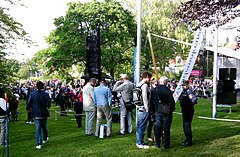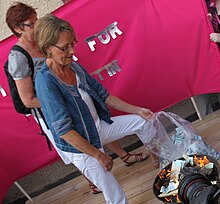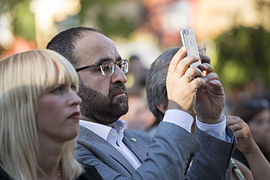57°38′26″N 18°17′27″E / 57.6406°N 18.2908°E / 57.6406; 18.2908
 Almedalen, main stage in July 2014 Almedalen, main stage in July 2014 | |
| Native name | Almedalsveckan |
|---|---|
| English name | Almedalen Week |
| Date | 25 July 1968 (1968-07-25) |
| Location | Almedalen, Visby, Sweden |
| Also known as | Politician's Week in Almedalen |
| Type | Political, social, business forum |
| Patron(s) | Participants |
| Organised by | Gotland Municipality |
| Website | www |
The Almedalen Week (Swedish: Almedalsveckan, [ˈâlmɛdɑːlsˌvɛkːan]), also known as Politician's Week in Almedalen (Swedish: Politikerveckan i Almedalen) is an annual event taking place in week 26 in and around Almedalen, a park in the city of Visby, Gotland, Sweden.
With speeches, seminars and other political activities, it is considered to be the most important forum in Swedish politics. During the week, representatives from the major political parties in Sweden take turns to make speeches in Almedalen.
It has inspired similar events to be held in other countries, like Suomi-Areena in Finland, Arendalsuka in Norway, Arvamusfestival in Estonia and Folkemødet at the island of Bornholm in Denmark.
History

The origin of the Almedalen Week was the speeches made by Olof Palme during several summers in Almedalen. He was in Visby because he and his family used to spend their summers at Fårö. It started with an improvised gathering that Palme, then education minister and candidate for the position of party leader for the Social Democratic party, and another party leader candidate, Krister Wickman had on 25 July 1968. Palme made his speech from the back of a flatbed truck at Kruttornet by the Almedalen park. The audience was a couple of hundred people.
Because of the origin of the Almedalen Week, Almedalen is sometimes nicknamed "Palmedalen".
The first official Almedalen Week took place in 1982, when the Social Democrats started to organise economic seminars. As a response, the other political parties started to take a more active part. The first time all of the major party leaders were present was in 1982.
In the middle of the 1980s, the week almost ceased to be. In the summer following the assassination of Olof Palme in 1986, only the Green Party and the Left Party were present. The rest of the parties expressed that political speeches in Almedalen were too associated with Palme as a person. Ingvar Carlsson, who became prime minister after Palme's death, said that he chose to hold his speeches at other locations in Visby during the following years out of respect for Palme. He only started speaking in Almedalen after having been persuaded to do so by Palme's widow, Lisbet Palme.
21st century

In recent years, the event has grown larger, with hordes of journalists, lobbyists, local and national politicians, employees from local, regional and national organisations and representatives of non-governmental organizations all coming to Visby to meet, discuss politics and socialize. As of 2015, it is the biggest and most important forum in Sweden for seminars, debates and political speeches on current social issues. In 2014, 3,513 activities were held, 866 journalists were accredited and over 30,000 participants were at the event. One important factor is that all seminars are free of charge. The absolute majority of them are also open to everybody.
On 6 July 2022, during a speech the psychiatrist Ing-Marie Wieselgren died after being stabbed by a right-wing extremist. The stabbing occurred near to a stage where Centre Party leader Annie Lööf was about to give a press conference. After the fatal stabbing, the perpetrator was apprehended by a pensioner and shortly thereafter arrested by police.
The number of activities, participants and journalists covering the week has increased during the years. These are the official numbers:
| Year | Activities | Organizers | Accredited journalists | Participants |
|---|---|---|---|---|
| 2016 | 3,796 | 1,756 | 650 | 40,000 |
| 2015 | 3,465 | 1,645 | 800 | 35,000 |
| 2014* | 3,513 | 1,459 | 866 | 35,000 |
| 2013 | 2,285 | 1,029 | 727 | 20,000 |
| 2012 | 1,818 | 986 | 709 | 17,000 |
| 2011 | 1,476 | 767 | 560 | 14,000 |
| 2010* | 1,396 | 758 | 900 | 11,000 |
| 2009 | 1,041 | 589 | 450 | 7,500 |
| 2008 | 662 | 350 | 362 | 6,000 |
| 2007 | 440 | 225 | 318 | 5,000 |
| 2006* | 463 | c. 175 | c. 500 | n/a |
| 2005 | 250 | c. 120 | c. 200 | n/a |
| 2004 | 140 | n/a | c. 120 | n/a |
| 2003 | 110 | n/a | n/a | n/a |
| 2002* | 90 | n/a | c. 110 | n/a |
| 2001 | 52 | n/a | n/a | n/a |
| * = election year | ||||
Organization
Almedalen Week is an annual event taking place in week 27 in and around Almedalen, a park in the city of Visby. It is coordinated by Gotland Municipality and the cost of the different activities is carried by the organization responsible for it. Each day of the week is dedicated to one of the political parties represented in the Riksdag, on a rotating schedule. In 2011, the number of days were extended to eight since there were then eight parties in the Riksdag. A number of other lobbyists, organizations, companies and representatives from municipalities and countries are also present.
Awareness

With the increasing numbers of activities it has become more difficult for the individual participants to get noticed by spectators and the media. This has resulted in a number of spectacular actions during the years. In 2010, the spokesperson for the Feminist Initiative, Gudrun Schyman, burned SEK 100,000 during a speech about the inequality in wages for men and women. In 2005, actress Kim Anderzon, artist Ernst Billgren, musician Olle Ljungström, among others, declared that a new party, the Kulturpartiet (the Cultural Party), had been created and that they were candidates for the Riksdag. It was later declared that the party had been an elaborate hoax created by the National Swedish Touring Theatre to raise awareness for cultural issues.
Criticism
Political scientist Maria Wendt has criticized the Almedalen Week and states that it has clarified how much politics in Sweden have become dependent on media, and now conforms to the terms and tools of the press, TV, radio and websites. Wendt says that whereas earlier media would report what went on in politics, it is presently more common to have debates taking place in the media itself. The language and messages delivered by politicians are conformed to fit in the frames provided by TV and newspapers, making comments short, powerful and lacking in nuances. The Almedalen Week is an event where such shortcomings are becoming more visible, according to Wendt. She suggested that instead of dedicating each day to one of the parties, the days should be used to highlight specific issues.
During the Almedalen Week journalists, politicians and lobbyists socialize in a way that under normal circumstances would not be considered correct. This has been compared to a liminal phase, a term used in social anthropology for when normal rules cease to apply for a short while, like during carnivals, after which everything returns to normal. What has previously been taboo, is allowed for a short while.
Similar events in other countries
Similar events have been held in Finland, Denmark and Norway. The Finnish event is called SuomiAreena, started in 2006 in the city of Pori. The Danish event Folkemødet [da] was started in 2011, on the Bornholm island. A Norwegian version of the week was held at Eidsvoll. The event was scheduled to take place in Arendal again in 2011, but was postponed because of the 2011 Norway attacks. The event is now back. In 2007, a South Korean delegation came to Visby to study the concept of the Almedalen Week. According to political scientist Yonhyok Choe, the island of Jeju is a likely candidate for the event. In 2013, the Arvamusfestival in Estonia was started.
Quote
Almedalen Week visitor Dennis Kucinich commented on the event:
When you see the kind of internecine conflict that happens in the United States— the partisan divide, the dichotomous thinking, the separation from each other—there is a different thing happening here in Sweden at Almedalen, which is a sense of a common bond as citizens with a common purpose for the nation. And people come together here. And the thing that impresses me is how quickly on the street you can get into the deepest discussions that have consequence. And so, that's why—you know, having been here only for two days, I've had a chance to meet people from every level of society, decision makers as well as citizens, and there's a sense that things matter in these kind of discussions, which are direct, relatively low-key, nonconfrontational, matter-of-fact. And behind it is— what animates it is a sense of commitment to each other and to the nation.
In 2014, the Almedalen Week was profiled by the US program Democracy Now!.
Speakers
These are the main speakers since 1968 in chronological order.
Gallery
-
 2010 – Red/Green campaign
2010 – Red/Green campaign
-
 2011 – Åsa Romson
2011 – Åsa Romson
-
 2013 – Jimmie Åkesson
2013 – Jimmie Åkesson
-
 2014 – Activists
2014 – Activists
-
 2015 – Mehmet Kaplan
2015 – Mehmet Kaplan
-
 2015 – Kristina Ljungros
2015 – Kristina Ljungros
References
- "Almedalsveckan 1968" [Almedalen Week 1968] (PDF). www.helagotland.se (in Swedish). Gotlänningen, Gotlands Allehanda, Gotlands Folkblad. Retrieved 7 February 2015.
- ^ "Almedalsveckans historia" [The history of Almedalen week]. almedalsveckan.info (in Swedish). Archived from the original on 13 October 2011. Retrieved 9 October 2011.
- Jonsson, Gunnar (5 July 2008). "Almedalen blev Palmedalen" [Almedalen became Palmedalen]. Dagens Nyheter (in Swedish). Retrieved 7 February 2015.
- Tidningarnas Telegrambyrå, ed. (4 July 2002). "Rusning till Almedalen" [Rushing for Almedalen]. www.corren.se (in Swedish). Östgöta Correspondenten. Retrieved 7 February 2015.
- Melstedt, Lillemor; Hermansson, Ralph (2006). "Ett gigantiskt minglande Palmedal" [A gigantic mingle in the Palmedalen]. Från riksdag & departement (in Swedish). 22: 12–13. Retrieved 7 February 2015.
- Melin, Annika (27 June 2009). ""Gotland och Visby ska vara stolta"" ["Gotland and Visby should be proud"]. Gotlands Tidningar (in Swedish). www.helagotland.se. Retrieved 7 February 2015.
- Wendt, Maria (6 July 2014). "Almedalen – ett nationalromantiskt spektakel" [The Almedalen Week – a spectacle in the spirit of national romanticism]. Svenska Dagbladet (in Swedish). Retrieved 7 February 2015.
- ^ "Uppdaterad statistik 2014" [Updated statistics 2014]. www.almedalsveckan.info (in Swedish). Gotland Municipality. Archived from the original on 2015-02-08. Retrieved 7 February 2015.
- "Statistik Almedalsveckan" [Statistics for Almedalen week]. www.almedalsveckan.info (in Swedish). Gotland Municipality. Archived from the original on 4 March 2016. Retrieved 7 February 2015.
- "Statistik Almedalsveckan 2015". www.almedalsveckan.info. Region Gotland. Archived from the original on 20 January 2016. Retrieved 16 December 2015.
- Rågsjö Thorell, Andreas (25 September 2015). "Storsatsning: Sveriges Radio har 94 medarbetare på Bokmässan". www.resume.se. Resumé. Retrieved 16 December 2015.
- "Statistik Almedalsveckan 2016". www.almedalsveckan.info. Region Gotland. Archived from the original on 7 July 2017. Retrieved 3 July 2017.
- Enderborg, Bernt. "Almedalen". www.guteinfo.com (in Swedish). Guteinfo.com. Retrieved 6 February 2015.
- "Så här fungerar en Almedalsvecka" [This is how a Almedalen week works]. almedalsveckan.info (in Swedish). Archived from the original on 2011-10-13. Retrieved 9 October 2011.
- ^ Lönaeus, Olle (29 July 2014). "Åsiktsmarknad lockar besökare från alla läger" [Market of opinions attracts visitors from all sides]. www.sydsvenskan.se (in Swedish). Sydsvenskan. Retrieved 8 February 2015.
- "Viktigt att synas i Almedalen" [Important to get noticed in Almedalen]. Sveriges Radio (in Swedish). 7 July 2010. Retrieved 8 February 2015.
- Svensson, Niklas (5 July 2005). "Kulturpartiet – en dyr bluff" [The Cultural Party – An expensive hoax]. www.expressen.se (in Swedish). Expressen. Retrieved 8 February 2015.
- Stiernstedt, Jenny (3 July 2012). ""Almedalen ett enda medieutspel"" ["The Almedalen Week, one big media gambit]. Svenska Dagbladet (in Swedish). Retrieved 8 February 2015.
- Medierna, ed. (9 July 2012). "Karnevalen i Almedalen". Sveriges Radio (in Swedish). Retrieved 8 February 2015.
- "Succé i Norge för kopia av Almedalsveckan" [Success in Norway for a copy of the Almedalen week]. Sveriges Radio (in Swedish). 27 November 2012. Retrieved 6 February 2015.
- Stiernstedt, Jenny (29 June 2012). "Almedalen på export" [Exporting the Almedalen Week]. Svenska Dagbladet (in Swedish). Retrieved 8 February 2015.
- "Världen följer efter" [The world follows suit]. www.almedalsveckan.info (in Swedish). Gotland Municipality. Archived from the original on 8 February 2015. Retrieved 8 February 2015.
- "Estonia – Civil society". www.freedomhouse.org. Freedom House. Retrieved 6 February 2015.
- "Almedalen Week: At Sweden's One-of-a-Kind Festival, All Political Parties Gather in One Place". Democracy Now!. 2014-07-02. Retrieved 2014-07-03.
- "Alla talare sedan 1968" [All speakers since 1968]. www.almedalsveckan.info (in Swedish). Gotland Municipality. Retrieved 8 February 2015.
- "Talare 2015" [Speakers in 2015]. www.almedalsveckan.info. Gotland Municipality. Archived from the original on 1 July 2015. Retrieved 28 June 2015.
- "Talare 2016" [Speakers in 2016]. www.almedalsveckan.info. Gotland Municipality. Retrieved 29 June 2016.
- "Talare 2017" [Speakers in 2017]. www.almedalsveckan.info. Gotland Municipality. Retrieved 3 July 2017.
- Larsson, Mats J (5 July 2015). "Publikras för Almedalsveckan" [Audience failed at Almedalen week]. Dagens Nyheter. Retrieved 6 July 2015.
- "Samtliga partiledare talar under årets Almedalsvecka!". Almedalsveckan (in Swedish). Retrieved 2022-01-07.
Further reading
- Wendt, Maria (2012). Politik som spektakel – Almedalen, mediemakten och den svenska demokratin [Politics as a spectacle – Almedalen, the power of the media and the Swedish democracy] (in Swedish). Stockholm: Atlas. ISBN 978-91-7389-409-8.